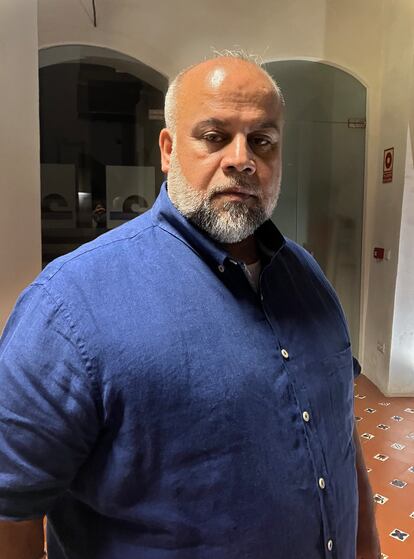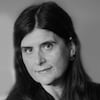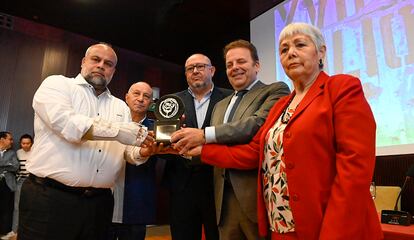Wael Dahdouh: ‘Gazan journalists are only able to report a small part of the barbarism’
The bureau chief of Al Jazeera television in the Strip, who lost his wife and three of his sons in bombings, tells EL PAÍS that Israel is ‘deliberately killing journalists in Gaza’ to prevent them reporting on the war


Images of Palestinian journalist Wael Dahdouh, bureau chief of the Qatar-based Al Jazeera television network in Gaza, went around the world when he lost his wife, two children, a grandson and other family members in an Israeli bombing in October. The 53-year-old veteran reporter decided to put aside the pain of loss and “continue to work and assume my responsibility to make a difference.” Two months later, he himself was injured in an Israeli attack that killed his cameraman, Samer Abu Daqqa, and, in January, his eldest son, Hamza, perished when his car was targeted in a strike.
Without intending to, Dahdouh has become a symbol of the suffering of Gaza’s 2.2 million inhabitants and of the perseverance of its reporters, who are the eyes of the world in this conflict, with no foreign media allowed to enter the Strip. “I believe in the humanitarian mission of journalism. Our job is to continue reporting,” he told this newspaper in Córdoba, in southern Spain, where he received the Julio Anguita Parrado journalism award and gave a lecture at the Casa Árabe.
According to Reporters Without Borders (RSF), more than 100 journalists have died violently in Gaza since October. The Committee to Protect Journalists says the conflict, in which at least 33,000 Palestinians have been killed, is the bloodiest for reporters since the organization began its tally in 1992.
After more than 100 days covering the Israeli military offensive, Dahdouh left Gaza at the end of January for surgery in Qatar. Tired and visibly shaken by reliving the death of his family, the reporter does not dare to imagine his future, or that of Gaza. “No one in the Strip knows what is going to happen, whether this war will end in a week or will drag on for months.”
Question. You have dedicated this award, named after a Spanish journalist who lost his life in the Iraq war in 2003, to your colleagues who continue to report in Gaza and insist that reporters in the Strip are being targeted and are not collateral damage.
Answer. Israel is deliberately killing journalists in Gaza. In other wars they did not target reporters like this. I can find no explanation for the shelling of the house where my family was sheltering in Nuseirat (central Gaza), for the attack that killed my son Hamza, or for the one in which I almost died. Most of these bombings are carried out with drones, which are very precise and know who is in that place at that moment. We move around in cars marked “Press” or “TV.” We wear the helmets and vests of journalists. Israel does not want us to continue documenting what is happening, but Palestinian journalists have decided to continue reporting, living in fear and knowing that we might become news.
Q. On October 7, 2023, the Islamist movement Hamas committed bloody attacks in Israel. Hours later, the bombardment of Gaza began. Did you think it would be an offensive similar to those you have covered over the past 15 years?
A. On October 7, I woke up to go to the office and saw from my window the rockets streaking across the sky toward Israel. I said to my late wife: ‘Let’s get ready because a long war is coming.’ From the outset I said it was going to last up to four months and they called me an exaggerator. Now I see that I was optimistic. All the calamities we have suffered in previous Israeli offensives are not even a quarter of what we are suffering in this one. From the beginning, the destruction was blind: Israel closed all border crossings, deprived Gaza of food, water, electricity, medicine, and bombed houses without warning.
Israel does not want us to continue documenting what is happening, but Palestinian journalists have decided to continue reporting
Q. Is there any moment in your coverage of the war that has particularly marked you?
A. I am inundated with painful images. But what is especially etched are the dead children, some of them babies, being pulled out of the rubble, perishing before our eyes. And of course, although I was not there when they died, I do not forget the bodies of my wife, my children, my grandson... What can I tell you? Each image I had to record was worse than the previous one.
Q. Part of your family is still in Gaza.
A. I had eight children and the five who are still alive left Gaza, but my brothers, sisters, nieces, nephews, and cousins are still there. Every day I receive some bad news: family members who were wounded and are struggling to recover, relatives who have nothing to eat...
Q. You have reiterated that when your wife and children were killed you did not hesitate to continue your work.
A. I believe in the humanitarian mission of journalism. Our job is to keep reporting. But at the moment, no matter how hard they try, Gazan journalists are only able to report a small part of the barbarism. From the beginning of the war, I always thought that I should work no matter what happened, but faced with the dead bodies of my children and my wife, who was the pillar of the family, I did have doubts about whether I should continue. I decided to continue. My wife and children always made sacrifices for me. They didn’t have my love and protection during the wars, so that I could continue to work and assume my responsibility to make a difference. Was I going to give up because they were killed? No. That’s why I went back to work. It was a challenge, because I didn’t want to appear in front of the camera in mourning and I didn’t want to talk about myself. I wanted to report the war in a professional manner, as if nothing had happened to me. I think I succeeded, but that bothered Israel.
Q. Now that you have had to leave Gaza, do you think your voice has lost strength or legitimacy because you are no longer inside the Strip?
A. Yes, indeed. My feeling is one of pain and frustration because I can no longer do my duty. I cannot be there where things are happening and I cannot help my compatriots who are suffering and the journalists who stayed behind, starting with my team. Sometimes I feel that I can no longer do much, but I continue to try to do my bit by coming, for example, here to Córdoba.

Q. You have praised the attitude of the Spanish government towards the Palestinians, but are words enough after six months of bombing?
A. It is clear that the people who are living the day-to-day life of the war need more support, more relief… They need more. The attitude of the Spanish government is very well received by Palestinians amid this atrocious war. We value it very much, as well as its work with other European governments to move from words to action, to apply pressure to achieve a ceasefire now and for the Palestinians to regain their rights. We know it is an arduous task.
Q. It is difficult to imagine and talk about the future that awaits Gaza.
A. It’s impossible to predict. No one in the Strip knows what is going to happen, whether this war will end in a week or will drag on for months. At times there is talk of an agreement, of a truce, but nothing is happening and the bombings are increasing. The people of Gaza are on edge, but they are afraid that this will last for a long time, that the war will last even longer.
Q. And you, how do you feel physically and how do you see your future?
A. I am very tired. I have undergone a long and complicated operation to try to save as much mobility as possible in my right hand. I may recover 60%, but I have a year of convalescence ahead of me. I want to heal and continue to be a journalist. That is the most important thing for me. I want to continue doing my job.
Sign up for our weekly newsletter to get more English-language news coverage from EL PAÍS USA Edition
Tu suscripción se está usando en otro dispositivo
¿Quieres añadir otro usuario a tu suscripción?
Si continúas leyendo en este dispositivo, no se podrá leer en el otro.
FlechaTu suscripción se está usando en otro dispositivo y solo puedes acceder a EL PAÍS desde un dispositivo a la vez.
Si quieres compartir tu cuenta, cambia tu suscripción a la modalidad Premium, así podrás añadir otro usuario. Cada uno accederá con su propia cuenta de email, lo que os permitirá personalizar vuestra experiencia en EL PAÍS.
¿Tienes una suscripción de empresa? Accede aquí para contratar más cuentas.
En el caso de no saber quién está usando tu cuenta, te recomendamos cambiar tu contraseña aquí.
Si decides continuar compartiendo tu cuenta, este mensaje se mostrará en tu dispositivo y en el de la otra persona que está usando tu cuenta de forma indefinida, afectando a tu experiencia de lectura. Puedes consultar aquí los términos y condiciones de la suscripción digital.








































